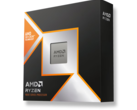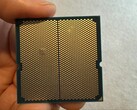For now, all eyes are on Intel's freshly unveiled Arrow Lake-S lineup of desktop processors. Intel seems to have taken an efficiency-first approach for this year's desktop offerings, promising performance equivalence at significantly lower power consumption. However, AMD may soon nab the spotlight from Intel, with the launch of its Ryzen 9000X3D lineup sometime next month.
We already have a rough idea of the upcoming 8-core Ryzen 9 9800X3D's Cinebench R23 performance, thanks to a recent leak that portrayed a 24% and 34% improvement in single-core and multi-core scores respectively. For the higher-end 16-core Ryzen 9 9950X3D, the improvements were slightly more modest, but still perfectly decent at 10% and 18% respectively.
Interestingly, HardwareLuxx recently shared images from their MSI factory tour, which, according to VideoCardz, contained slides concerning MSI's performance improvement claims for the Ryzen 9000X3D series over Ryzen 7000X3D. The results are admirable, and right in line with what we have heard so far.
As per the slides, MSI asserts that the 8-core Ryzen 9800X3D is 11% faster than the soon-to-be-retired Ryzen 7 7800X3D in Far Cry 6, while the 16-core Ryzen 9 9950X3D is 13% faster than the Ryzen 9 7950X3D in the same game. Both were run on systems with an RTX 4090 dGPU at 1080p resolution. That being said, the differences in performance in Black Myth: Wukong and Shadow of the Tomb Raider were far more subtle, ranging between 2% to 4%.
MSI also revealed the performance improvements in Cinebench R23, and the numbers seem to almost perfectly line up with the Cinebench R23 leak discussed earlier in this article. Both the 8-core and 16-core variants of the Ryzen 9000X3D series are expected to arrive early next month, so we won't have to wait long for more real-world performance tests.
Source(s)
HardwareLuxx, spotted by VideoCardz

















